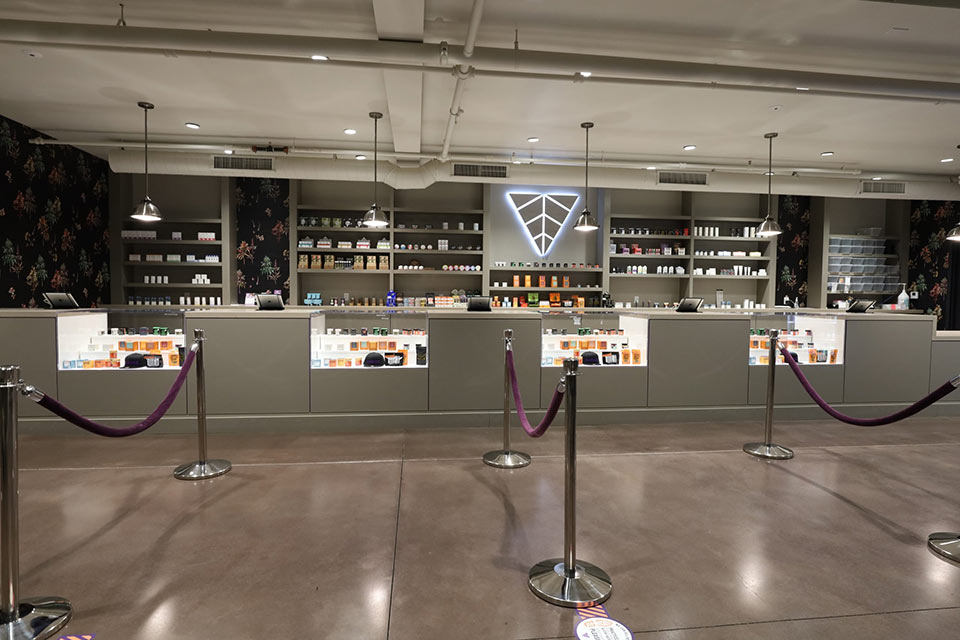Business
L.A. social equity companies lobby city for aid in face of extinction
Published
1 year agoon

This is the second installment in a two-part series on the social equity program in Los Angeles. Read part 1 here.
Although the cannabis industry landscape appears grim for many Los Angeles social equity entrepreneurs, there’s a small group of retailers that have been gathering in recent months to push for solutions and survival.
The 10 operators have been lobbying Mayor Karen Bass’s office and city council members for aid they say could help, such as municipal tax reform. But at this point, nothing is easy, and nothing is certain when it comes to L.A. social equity companies’ survival, sources told Green Market Report.
“Getting through this last six months has been a fucking slog,” said Whitney Beatty, one of the few L.A. social equity licensees who’s managed to survive this far – and she only done so by partnering with retail chain Off the Charts.
“We need a tax holiday so bad it hurts. I don’t know what we look like here in a year without it,” Beatty said. “The people I know, everybody is teetering on the edge of being open. It’s not like, some people are having a hard time. Everyone is having a hard time.”
Systemic problems
Incoming L.A. social equity shop owner Alexis Bronson, who’s been trying for years to succeed with various social equity programs in San Francisco and Oakland – including failed partnerships with High Times and MedMen Enterprises – said his plan to open a new west L.A. dispensary in August feels like walking into a buzz saw.
Bronson won one of the original L.A. social equity shop permits when names were first announced, but his original financing partnership with MedMen fell through. It wasn’t until he found the SoCal chain Velvet Cannabis that he was able to proceed with the L.A. venture. It took about $1.5 million and three years after striking the Velvet deal, but Bronson said he’s determined to make it work, despite all of the challenges he knows are inherent in the business.
“I’m seeing a lot of flameouts from people who had won their chance to open,” Bronson said of California social equity program participants. “It’s like I’m seeing the same movie over and over again. What I see is, people, they’re happy at first, and then when they realize how difficult it is … I’d say 90% of them are doing bad deals with people who don’t have their interests at heart, and that don’t believe in social equity, only insomuch as to get them in on the ground floor.”
Longtime L.A. cannabis businessman and social equity advocate, California Cannabis CEO and owner Virgil Grant, called the city’s program an “epic failure.”
Grant co-founded both the California Minority Alliance and the Southern California Coalition in the early days of L.A.’s social equity movement, organizations which are both now defunct. Grant said that there were simply too many flaws with the city’s social equity rollout, including how retail business permits were given to many who had no idea how to run a company. He also faulted city leaders for not providing enough financial and technical support to social equity entrepreneurs.
“When social equity was unanimously passed by L.A. City Council … a lot of us dusted our hands off and said, ‘Job well done,’ and went back to our businesses,” Grant remembered. “That was our biggest mistake, because now we understand that we should’ve kept our foot on the city’s neck and our hand on the pulse until every license was issued. We did not do that.”
Originally, Grant recalled, any social equity retail applicants were required to lock down locations for their shops before they could even apply for licensure, which put them between a rock and a hard place by forcing them to pony up serious money to pay rent for months on end without even knowing if there would be a return on the investment.
“All the money they had was dumped into that location, waiting on a license,” Grant recalled. “It just put people in a very bad situation to really do business.”
Possible solutions?
Beatty, who’s run Josephine & Billie’s since 2021, said her partnership with Off the Charts has thus far saved her business from extinction. (The shop rebranded to “Off the Charts powered by Josephine & Billie’s” after the financing deal was inked).
“I was running face first at a wall. We didn’t have enough money to survive, and taxes are killing everyone. It’s untenable, the amount of taxes we have to pay,” Beatty said, referring to the L.A. city and California state tax rates. She didn’t even include the federal 280E tax burden in her complaint.
Beatty acknowledged that her partnership with Off the Charts hasn’t proven to be a “cure-all.” But she also disagreed that social equity has been a failure.
Rather, Beatty characterized the L.A. program as a work in progress, despite the dismal numbers. Her take runs parallel to that of Oakland-based businesswoman Amber Senter, with whom Beatty does activism work at Supernova Women. Senter also told Green Market Report recently that it’s state and city policies that have made the industry unsustainable for small businesses in general.
“People are very quick to say social equity is a failure. And I don’t believe in failure,” Beatty said. “What I think is we have not put the right parts in place to get these companies up and off the ground. It takes a while to understand the economics and the industry to get this stuff right.”
To that end, she and nine other Black social equity dispensary owners – including Madison Shockley III, owner and CEO of Cadre, have been gathering regularly in a new attempt to lobby the L.A. mayor’s office and city council for help and further reforms. They’re asking for a tax holiday and to increase the availability of grants or other financial assistance, which may be a reach since the DCR report also found that L.A.’s cannabis tax revenue has been steadily declining since 2021.
Beatty said that such a move by the city would be a “game-changer.”
“For every dollar put into an equity program, the city can get at least $1.20 back, and upwards of $4, if they put the right pieces into place,” she said, citing a study done by Supernova Women.
Shockley said the reception thus far from the mayor – who championed cannabis reform while she was still serving in Congress – has been positive.
“We’ve met with the mayor at City Hall, and she’s expressed that she’s looking at ways to find relief for us. She’s asking all the right questions … But we’re still waiting for some actions,” Shockley said. “We’re at an extension moment. We could all be out of business in the next six months.”

Author: mscannabiz.com
MScannaBIZ for all you Mississippi Cannabis News and Information.
You may like
-


Kentucky still waiting on medical marijuana dispensaries 9 months after law passed
-


Can LSD Battle Anxiety? The Answer Is Yes, According to Science
-


Six hurt in shooting at marijuana event in SF's Bayview
-


Kentucky Medical Marijuana Dispensaries Should Be Stocked With Products Ready For Sale By Next Month, Top State Official Says
-


Deputies: 3,500 child sex abuse images, marijuana grow operation found in NC home raid
-


Regulators Ready to Enforce Cannabis Laws on Hemp THC Retailers in Maryland
Business
Nebraska medical cannabis regulations stall in legislative committee
Published
5 months agoon
April 18, 2025

A Nebraska legislative committee voted 5-3 against advancing a bill designed to implement and regulate the state’s medical cannabis program, leaving legislators and advocates searching for alternative paths forward, according to the Nebraska Examiner.
The General Affairs Committee rejected Legislative Bill 677, sponsored by State Sen. Ben Hansen of Blair, during a Thursday vote where committee members declined to offer amendments to the legislation, the publication reported.
“I don’t want to shut all the doors right now, but some doors are closing, and they’re closing fast, and so we have to act,” Hansen told reporters after the vote, according to the Examiner.
Nebraska voters approved medical cannabis in November 2024, with residents legally permitted to possess up to 5 ounces with a healthcare practitioner’s recommendation since mid-December. However, the regulatory commission created by the ballot initiative lacks effective power and funding to regulate the industry.
Hansen described his legislation as “a must” for 2025 to prevent a “Wild West” scenario in the state’s cannabis market. The bill would have expanded regulatory structure through the Nebraska Medical Cannabis Commission and extended deadlines for regulations and licensing to allow more time for implementation, the Examiner noted.
Committee disagreements centered on proposed restrictions. A committee amendment would have prohibited smoking cannabis and the sale of flower or bud products while limiting qualified healthcare practitioners to physicians, osteopathic physicians, physician assistants or nurse practitioners who had treated patients for at least six months.
The amendment also would have limited qualifying conditions to 15 specific ailments including cancer, epilepsy, HIV/AIDS, and chronic pain lasting longer than six months.
State Sen. Bob Andersen of Sarpy County opposed allowing vaping due to concerns about youth drug use, while committee chair Rick Holdcroft suggested selling cannabis flower would be “a gateway toward recreational marijuana,” a claim Hansen “heavily disputed,” according to the Examiner.
Hansen now faces a difficult path forward, requiring at least 25 votes to pull the bill from committee and then needing 33 senators to advance it across three rounds of debate, regardless of filibuster attempts.
Crista Eggers, executive director of Nebraskans for Medical Marijuana, remained optimistic despite the setback.
“This will not be the end,” Eggers said, according to the outlet. “Giving up has never been an option. Being silenced has never been an option. It’s not over. It’s not done.”
The legislative impasse is further complicated by ongoing litigation. Former state senator John Kuehn has filed two lawsuits challenging the voter-approved provisions, with one appeal pending before the Nebraska Supreme Court. The state’s Attorney General is also trying to do something about the hemp question, akin to other states across the country.

Author: mscannabiz.com
MScannaBIZ for all you Mississippi Cannabis News and Information.
Business
One of Las Vegas’ cannabis lounges closes its doors
Published
5 months agoon
April 18, 2025

Nevada’s cannabis lounge experiment faces some expected growing pains, with one of just two state-licensed venues closing its doors after barely a year in business, according to the Las Vegas Weekly.
“The regulatory framework, compliance costs and product limitations just don’t support a sustainable business model,” said Thrive Cannabis managing partner Mitch Britten, who plans to convert the space into an event venue until regulations loosen up.
The closure leaves Planet 13’s Dazed Consumption Lounge as the only operational state-regulated cannabis lounge in Nevada. Dazed manager Blake Anderson estimates the venue attracts around 250 customers daily, primarily tourists. One other establishment, Sky High Lounge, has operated since 2019 on sovereign Las Vegas Paiute Tribe land exempt from state regulations.
Even with Nevada regulators conditionally approving 21 more lounge licenses, potential owners are struggling to meet the $200,000 liquid assets requirement – particularly social equity applicants from communities hit hardest by prohibition.
Recreational marijuana has been legal statewide since 2017, but public consumption remains prohibited. That’s created an obvious disconnect for the millions of tourists who visit Las Vegas annually but have nowhere legal to use the products they purchase. The state recorded roughly $829 million in taxable sales during the 2024 fiscal year.
“It always comes down to money, and it’s difficult to get a space if you can’t afford to buy a building. On top of that, getting insurance and finding a landowner who’s willing to lease to a cannabis business is a challenge in and of itself,” said Christopher LaPorte, whose consulting firm Reset Las Vegas helped launch Smoke and Mirrors, told Las Vegas Weekly.
Many think the key to future success lies in legislative changes that would allow lounges to integrate with food service and entertainment – playing to Las Vegas’s strengths as a hospitality innovator. In the meantime, the industry will continue to adapt and push forward.
“Things take time,” LaPorte said. “There’s a culture that we have to continue to embrace and a lot of education that we still have to do. But at the end of the day, tourists need a place to smoke, and that’s what these places are.”

Author: mscannabiz.com
MScannaBIZ for all you Mississippi Cannabis News and Information.


Psyence Group Inc. (CSE: PSYG) told investors that it will be consolidating all of its issued and outstanding share capital on the basis of every 15 existing common shares into one new common share effective April 23, 2025 with a record date of April 23, 2025. As a result of the consolidation, the issued and outstanding shares will be reduced to approximately 9,387,695 on the effective date.
This is the second time a Psyence company has consolidated shares recently. In November, its Nasdaq-listed associate, Psyence Biomedical Ltd. (Nasdaq: PBM), implemented a 1-for-75 share consolidation as the psychedelics company worked to maintain its Nasdaq listing.
Psyence Group reported earnings in February when the company delivered a net loss of C$3 million and was reporting as a going concern. At the end of 2024, the company said it had not yet achieved profitable operations, has accumulated losses of C$48,982,320 since its inception.
Total assets at the end of 2024 were C$11,944,478 and comprised predominantly of: cash and cash equivalents of C$10,611,113, other receivables of C$159,808, investment in PsyLabs of C$1,071,981 and prepaids of C$68,243.
Still, the company is pushing ahead. Psyence told investors that it has historically secured financing through share issuances and convertible debentures, and it continues to explore funding opportunities to support its operations and strategic initiatives. “Based on these actions and
management’s expectations regarding future funding and operational developments, the company believes it will have sufficient resources to meet its obligations as they become due for at least the next twelve months,” it said in its last financial filing.
The company said it believes that the consolidation will position it with greater flexibility for the development of its business and the growth of the company.

Author: mscannabiz.com
MScannaBIZ for all you Mississippi Cannabis News and Information.

Kentucky still waiting on medical marijuana dispensaries 9 months after law passed

Can LSD Battle Anxiety? The Answer Is Yes, According to Science

Six hurt in shooting at marijuana event in SF's Bayview

Kentucky Medical Marijuana Dispensaries Should Be Stocked With Products Ready For Sale By Next Month, Top State Official Says

Deputies: 3,500 child sex abuse images, marijuana grow operation found in NC home raid

Regulators Ready to Enforce Cannabis Laws on Hemp THC Retailers in Maryland

California reaps over $250 million from 2nd Quarter cannabis sales

Meet the World’s First Cannabis Rugby Team: Crewmen 7’s Tackle Stigma Head-On

Texas Supreme Court Refuses To Take Up Marijuana Case Challenging State’s Rejection Of Local Decriminalization Law

California Passes Bill to Ban Intoxicating Hemp Products Outside Cannabis Market

Pending Federal Hemp Legislation Could Reshape The Legal Industry By Banning Some Products (Op-Ed)

Verano Proposes to Redomicile Parent Company From British Columbia to Nevada

8,000 cannabis plants seized from illegal Bradford grow-op

New York Lawmakers Schedule Psychedelics-Focused Hearing To Discuss ‘Medicinal Value And Risks’ Of Psilocybin

Curaleaf Opens Cannabis Dispensaries in Florida, Ohio

How to Protect Your Outdoor Cannabis Crops From Pests

Feds provide anti-cannabis group a platform to bash legalization (Newsletter: September 15, 2025)

Dozen arrested after south Mississippi bust for illegal sales to underage customers

The Toking Traveler: Why Amsterdam Weed Is Mostly Boof

Arkansas Medical Marijuana Sales Are On Track To Set A New Annual Record

When Cannabis Brands Blur Into Youth Culture, Regulators Notice: Lessons From Tobacco’s Past

Rhode Island Marijuana Dispensary License Application Process Officially Launches

Middle school student found with cannabis in bookbag, Charles County deputies say

Smugglers who brought drugs on an industrial scale into Wales jailed

Alert: Department of Cannabis Control updates data dashboards with full data for 2023

Connecticut Appoints The US’s First Cannabis Ombudsperson – Yes there is a pun in there and I’m Sure Erin Kirk Is Going To Hear It More Than Once!

5 best CBD creams of 2024 by Leafly

EU initiative begins bid to open access to psychedelic therapies
New Study Analyzes the Effects of THCV, CBD on Weight Loss

Free delta-9 gummies from Bay Smokes

Discover New York’s dankest cannabis brands [September 2024]

5 best autoflower seed banks of 2024 by Leafly

Press Release: CANNRA Calls for Farm Bill to Clarify Existing State Authority to Regulate Hemp Products

Curaleaf Start Process Of Getting Their Claws Into The UK’s National Health System – With Former MP (Resigned Today 30/5/24) As The Front Man

May 2024 Leafly HighLight: Pink Runtz strain

Local medical cannabis dispensary reacts to MSDH pulling Rapid Analytics License – WLBT

Recreational cannabis on ballot for third time in South Dakota

5 best THC drinks of 2024 by Leafly

Horn Lake denies cannabis dispensary request to allow sale of drug paraphernalia and Sunday sales | News

Mississippi city official pleads guilty to selling fake CBD products

6 best CBD gummies of 2024 by Leafly

Nevada CCB to Accept Applications for Cannabis Establishments in White Pine County – “Only one cultivation and one production license will be awarded in White Pine County”

The Daily Hit: October 2, 2024

5 best delta-9 THC gummies of 2024 by Leafly

Weekly Update: Monday, May 13, 2024 including, New Guide for Renewals & May Board meeting application deadline

PRESS RELEASE : Justice Department Submits Proposed Regulation to Reschedule Marijuana

5 best THCA flower of 2024 by Leafly

People In This State Googled ‘Medical Marijuana’ The Most, Study Shows
Trending
-

 California Cannabis Updates1 year ago
California Cannabis Updates1 year agoAlert: Department of Cannabis Control updates data dashboards with full data for 2023
-

 Breaking News1 year ago
Breaking News1 year agoConnecticut Appoints The US’s First Cannabis Ombudsperson – Yes there is a pun in there and I’m Sure Erin Kirk Is Going To Hear It More Than Once!
-

 best list1 year ago
best list1 year ago5 best CBD creams of 2024 by Leafly
-

 Business12 months ago
Business12 months agoEU initiative begins bid to open access to psychedelic therapies
-

 cbd1 year ago
cbd1 year agoNew Study Analyzes the Effects of THCV, CBD on Weight Loss
-

 Bay Smokes1 year ago
Bay Smokes1 year agoFree delta-9 gummies from Bay Smokes
-

 cannabis brands12 months ago
cannabis brands12 months agoDiscover New York’s dankest cannabis brands [September 2024]
-

 autoflower seeds12 months ago
autoflower seeds12 months ago5 best autoflower seed banks of 2024 by Leafly
